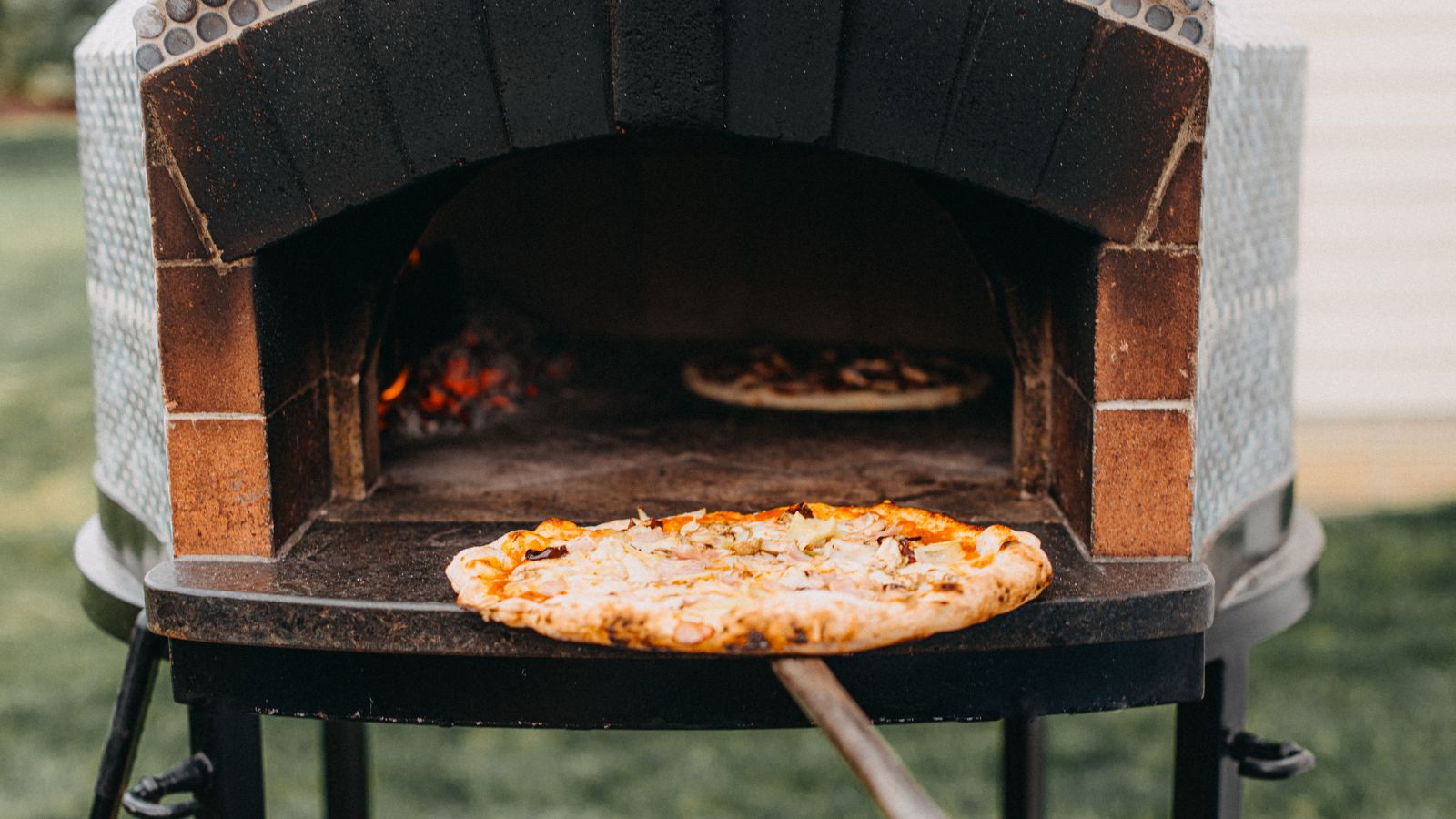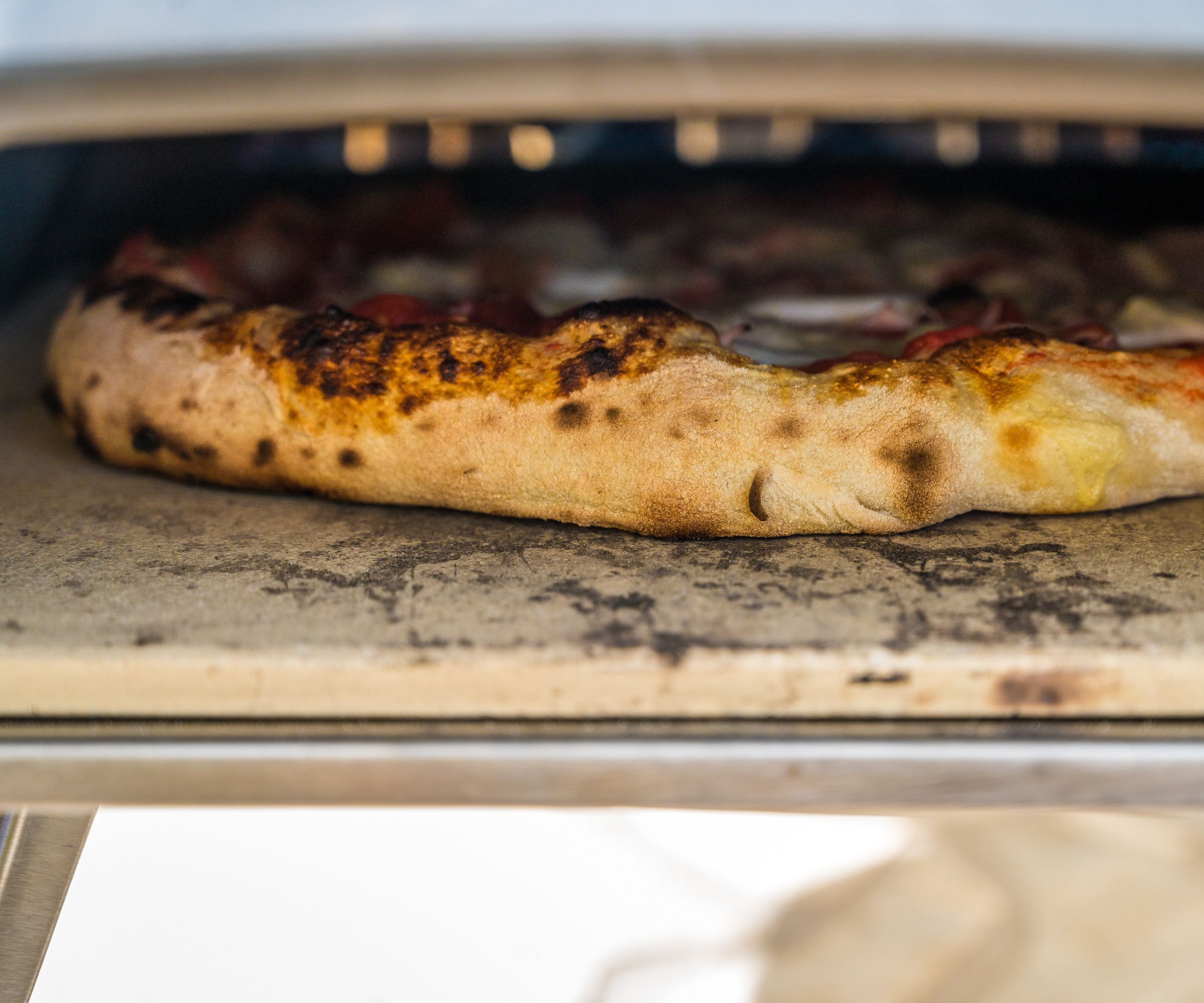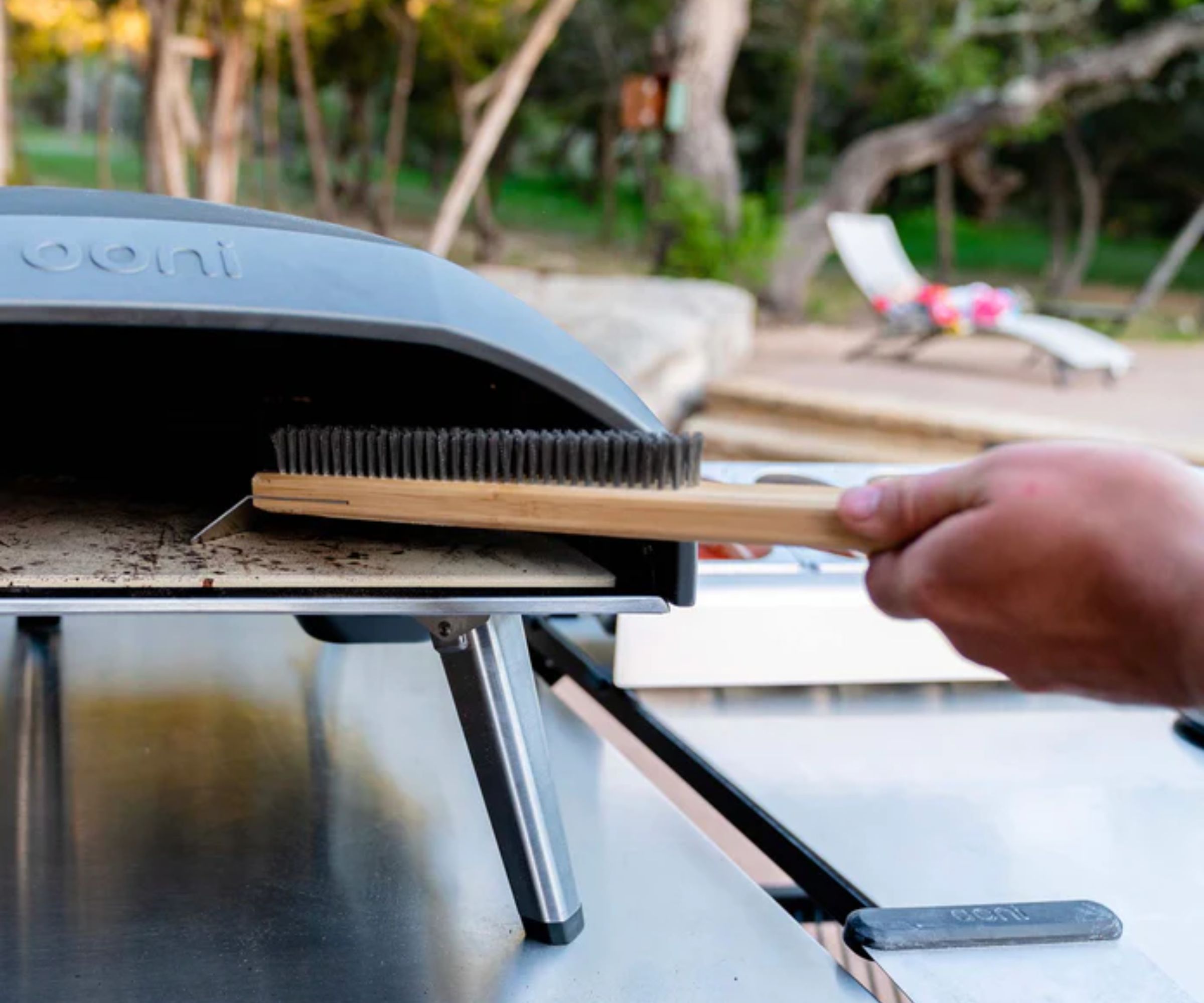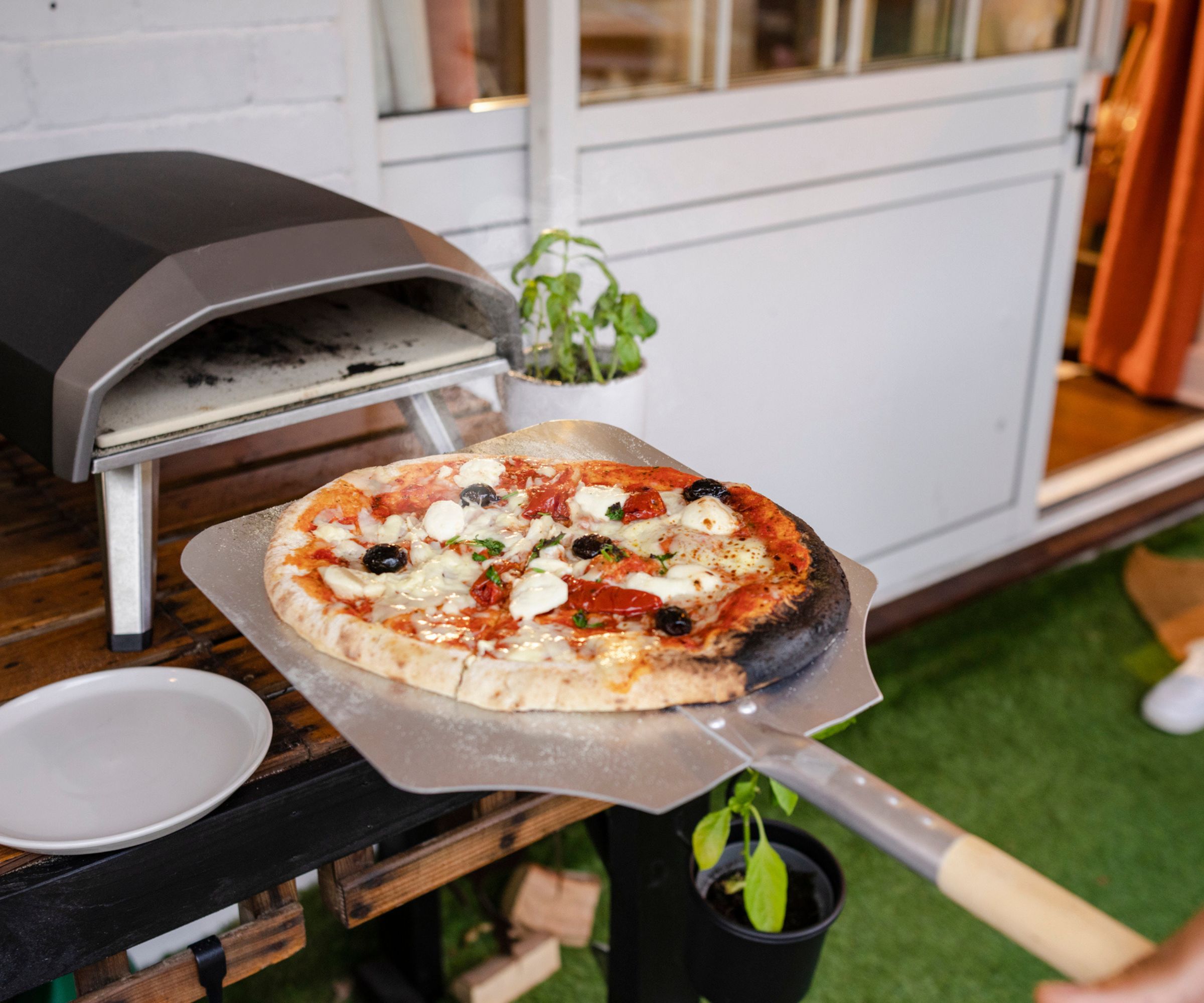How to clean a pizza oven – mistakes I made so you don't have to
This is how to clean a pizza oven


The first time I ever used a pizza oven, I made an incredible mess. I hadn't heated up the stone enough, there was no flour on my peel, and the crust of my pizza was too thin.
This all meant that the delicious vegetable pizza I'd spent the past half hour perfecting welded itself to the pizza stone and immediately burnt to a crisp. I then spent my evening frantically googling 'how to clean a pizza oven' and inventing new concoctions with baking soda to try and undo the damage.
Even the best pizza ovens can be tricky to clean, so it pays off to learn how. Dozens of pizza ovens later - and after some advice from my sources among professional pizzaiolos - here's everything you need to know.

Step 1: Safety
It sounds like an obvious point, but it's incredibly important. Make sure that your pizza oven is switched off and completely cool. This is always an essential step with any appliance with a heating element, but it's extra important with pizza ovens. Pizza ovens get twice as hot as almost any other domestic appliance, so a mistake here can lead to significant injury.
Once cooled, if you find you need to lift or move the oven to get a better clean, be wary of any sharp edges hidden underneath the main body. I have a fair few scars on my hands after picking up little nicks and cuts from poorly-machine pizza ovens.
Step 2: Brushing

Thankfully, the cleaning itself is very easy. Though they can look pretty gnarly thanks to years of burnt-on char, pizza stones season like pans. Though the black char doesn't always seem appetizing, it's completely food-safe. It's part of the smoky taste that makes pizza ovens so much tastier than a normal oven. Baker and chef Tamara Earl told me that 'pizza stones are like fine wine—they get better with age.'
That means all you need to do is brush away the worst of the soot to prevent a build-up and a potential fire. Chef Tamara told me that you just need to 'get an oven brush and sweep away those pesky crumbs and charred bits.'
You don't need any chemicals or special products, just brush down the inside. You can find expensive name-brand pizza oven brushes at Ooni, for example, but you can make do with a cheap pizza oven brush like this from Amazon. You don't even need to buy these; a regular dustpan brush will do the job.
Frank Kabatas, Owner and Operator at East Village Pizza, gave me some advice for a really deep clean. 'The most important part is cleaning the inside of the pizza oven. For the interior, begin by gently scrubbing the oven with warm water using a sturdy metal brush for a few minutes.' After that, run the oven for about an hour to evaporate any water. He also said you can use a mix of baking soda and lemon juice to lightly clean a pizza stone. 'Once you apply this paste to the stone, use some hot water and a good microfiber towel to rinse and dry it off, and you’re all set.'

Frank Kabatas is Owner and Operator of East Village Pizza, the popular New York pizzeria where tradition meets innovation. With a career spanning three decades in the pizza industry, Frank continues to use his experience and expertise to hone his craft of pizza-making

CEO, Founder, and head chef Tamara runs vegan restaurant Delectablez.
Step 3: Clean the outside
The outside of pizza ovens always gets a little dirty. There's lots of tomato sauce and flour flying around as you cook and it's best to clean this from the outside of the oven before it's baked on.
Cleaning the sides is easy, you just need a microfibre cloth, and if your oven is stainless steel or aluminum, it might benefit from a stainless steel cleaner like this from Target. Pizzaiolo Frank Kabatas told me that 'you can use any mild degreaser and rinse it off with some warm water, making sure to fully wipe it down with your towel.'
What you should never do
There are two things to avoid when cleaning a pizza oven. The first is that you should soak the stone in water. Pizza stones are almost always made of cordierite, which is permeable. Any water you use to clean the stone will be absorbed. This will prevent your pizza stone from reaching the right temperature, which means that it won't cook effectively, and the dough is also more likely to stick to a damp stone. More importantly, a damp stone is likely to crack, which can be dangerous. A small amount of water is fine, but too much will take days to dry.
The other mistake is using chemical cleaners. Again, these can be absorbed into the stone, which at best will make your pizza taste soapy and at worst will make it toxic.
You shouldn't use chemical cleaners on the inside of the oven. These are usually flammable, and because most outdoor pizza ovens use open flames, this can pose a fire risk.
How to cook pizzas to minimize cleaning

Being smart about how you make your pizzas can also cut down on your cleaning. Make sure your pizza crust is fairly thick - about a half inch - because otherwise sauce can leak onto the stone and burn into a tough stain.
Make sure you put flour on your pizza peel before inserting your pizza, because this forms a barrier between your pizza and the stone, which stops it from sticking. However, don't overdo it, because too much flour can cause a fire.
FAQ
What should I do if my pizza stone is wet?
If your pizza stone gets wet, let it air dry for a few days. Do not attempt to dry it in the oven, because this may cause it to crack.
We've covered lots of crucial information about pizza ovens, from how to light a pizza oven to the best wood for a pizza oven.
Sign up to the Homes & Gardens newsletter
Design expertise in your inbox – from inspiring decorating ideas and beautiful celebrity homes to practical gardening advice and shopping round-ups.

As a gardens and lifestyle contributor, Alex makes sure readers find the right information to help them make the best purchase. Alex got his start in reviewing at the iconic Good Housekeeping Institute, testing a wide range of household products and appliances. He then moved to BBC Gardeners’ World Magazine, assessing gardening tools, machinery, and wildlife products.
-
 7 expert-approved painting hacks to minimize clean up – to make an already exhausting task easier
7 expert-approved painting hacks to minimize clean up – to make an already exhausting task easierAvoid a backbreaking clean-up after your next painting project with advice from the professionals
By Chiana Dickson
-
 Gwyneth Paltrow's quiet luxury kitchen is so beautiful, we almost overlooked her ultra-smart cabinets – they make the use of 'every inch' of storage space
Gwyneth Paltrow's quiet luxury kitchen is so beautiful, we almost overlooked her ultra-smart cabinets – they make the use of 'every inch' of storage spaceThe Goop founder makes use of dead space in her kitchen with customized cabinetry that reaches to the ceiling, providing ample storage
By Hannah Ziegler